RESEARCH & SCIENCE
 THE BOTANIC GARDEN COLLECTION
THE BOTANIC GARDEN COLLECTIONA journey through 470 million years of plant history
There is hardly any other place at Johannes Gutenberg University Mainz (JGU) that is as inviting to relax or take a stroll as the Botanic Garden. However, it is much more than simply a recreational facility. The garden is a place of research and teaching while it also provides a storehouse of rare plants, which is the largest of all the collections present on campus.
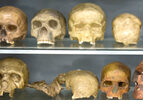 OSTEOLOGICAL STUDY COLLECTION
OSTEOLOGICAL STUDY COLLECTIONHistory in skulls
Over the past three years, PD Dr. Holger Herlyn of the Institute of Anthropology at Johannes Gutenberg University Mainz (JGU) has assembled a modern teaching collection of replica skulls that document the development of human beings and their relationship to other primates. The exhibits in the collection's display cabinets are ready to be investigated by the probing hands of the students.
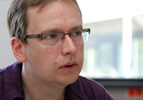 CIS Visiting Professor
CIS Visiting ProfessorTheme parks in the center of research
Amusement and theme parks are supposed to be fun. These amenities are all about the excitement of roller coasters, about spectacle, and entertainment. That’s it! Is it? American cultural anthropologist Scott A. Lukas has made theme parks his specialty. He is currently at Johannes Gutenberg University Mainz (JGU) as a visiting professor to report on his experiences and to teach, but he also came to learn.
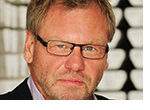 GEOSCIENCES
GEOSCIENCESThe climate remains a mystery
In his book Geschichte des Klimas (A history of the climate), one of the leading paleoclimate researcher takes us on a journey through the geological eras. Professor Dr. Frank Sirocko of the Institute of Geosciences at Johannes Gutenberg University Mainz (JGU) provides insight into the past while also venturing to forecast the future.
 UNIVERSITY HISTORY
UNIVERSITY HISTORYHow the French brought Comparative Literature to Mainz
An institute unique to Germany and treasures from the Mainz University Archive were the two main topics of the lecture evening held in the Central Library of Johannes Gutenberg University Mainz (JGU). Through this and similar events, the University History Research Association hopes to throw light on the history of the university. The evening commenced with a look at the subject of Comparative Literature.
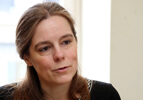 PRE- AND PROTOHISTORY
PRE- AND PROTOHISTORYCaesar’s Gallic Wars come to life
Dr. Sabine Hornung of the Institute of Pre- and Protohistory at Johannes Gutenberg University Mainz (JGU) created quite a stir in the summer of 2012: She had identified the oldest Roman military camp yet to be found in Germany, a huge fort that most likely played an important role in Julius Caesar's Gallic Wars. Her announcement attracted a lot of attention, but the archaeologist is having trouble funding her project.
 GLOBAL WESTERN
GLOBAL WESTERNThe cowboy travels the world
Through his pioneering project "Global Western – Intercultural Transformations of the American Genre par Excellence", Dr. Thomas Klein of the Department of Anthropology and African Studies at Johannes Gutenberg University Mainz (JGU) is scouting uncharted vistas. Many aspects of the Western still remain unexplored. With the project now reaching its conclusion, the cultural studies expert convened a conference, including a preview on future research topics.
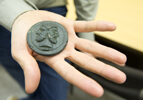 COIN COLLECTION
COIN COLLECTIONRoman small change was rather big
Although the coin collection of the Department of History's Ancient History division at Johannes Gutenberg University Mainz (JGU) fits into a single vault, it still holds quite a few surprises – at least for the layperson. Huge Roman coins sit beside ranks of imperial representations. Alexander the Great and Cleopatra can be admired here in silver, gold, and bronze.
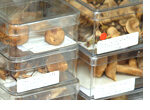 HERBARIUM
HERBARIUMThe collection is growing and growing
The herbarium at Johannes Gutenberg University Mainz (JGU) is hardly known – although it includes a number of rare plants and fungi, some of which are still awaiting proper classification. In addition to the extensive array of fungi and plants native to the Rhineland-Palatinate region and gathered from the Mainz Sand Dunes nature reserve, there are also exotic specimens from Costa Rica and Rwanda. Dr. Gudrun Kadereit shows what the herbarium has in store.
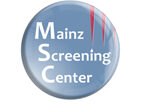 MAINZ SCREENING CENTER
MAINZ SCREENING CENTERDiscovering nature
Robots search for new drugs to fight cancer and Alzheimer's and analyze the effects of nanoparticles in humans: at the Mainz Screening Center, Professor Dr. Roland Stauber and his colleagues work in a whole range of fields. The Mainz Screening Center is at the hub of a widely distributed network consisting of a group of highly varied institutions.
